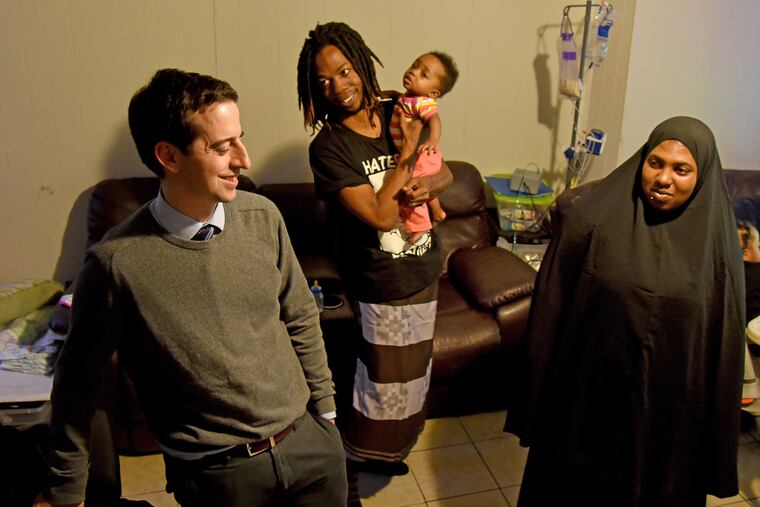Newall: In Philly's housing court, the deck is stacked - but this woman won anyway

The house Gerrell Martin was living in was unfit for human habitation.
Gerrell didn't need anyone to tell her that. But now there it was in black and white from the Department of Licenses and Inspections.
With winter approaching, she had filed the October complaint – her fifth in three years – to get a succession of landlords to do something about the heat. Namely, to get it to work. She and her children had suffered three winters in the Harrowgate home. She'd call. The landlord would ignore her. If someone did come, the heat was soon out again.
She and her husband, Curtis Sampson, are a blended family. Between the two of them they had five kids. On many icy nights 2-year-old Haneef was bundled between them. Haneef has cerebral palsy and chronic lung disease. A cold could mean a trip to the emergency room. Gerrell has lost count of those trips.
Last spring, came the baby, No. 6. Three years into battle with people who told her they'd help, but never did, the couple decided to name their daughter Honesty. It seemed fitting.
People would tell Gerrell to move from the cold house on Clarence Street. As if that were a choice.
She had been laid off from her job as a housing counselor at the now-closed Partnership Community Development Corp. (She had helped homeowners navigate foreclosures.) She was left with only her weekend job as a caregiver in a mental-health facility. The security deposit and first and last months' rent – $1,950, in all – had wiped her out. Curtis worked a dishwashing job. She jumped at overtime.
Now she questioned herself as a parent. She worried the space heaters would set the place on fire.
She told me she felt homeless in her own home. "Trapped," she said.
In October, unwilling to face another hard winter, she fought back. With the city violations in hand, she withheld rent, putting it in escrow. In response, her landlord acted quickly. The letter came in weeks: Gerrell and her family had to leave in 20 days.
In Philadelphia, this part of Gerrell's story is common.
The national eviction epidemic is hitting Philly's poorer and blackest neighborhoods the hardest. While City Council has passed licensing requirements to check abusive landlords, the playing field is far from even.
It's simple: Landlords have attorneys. Tenants don't.
Nearly, 24,000 tenants were sued for eviction in Philly last year, but as Jake Blumgart at PlanPhilly reported last week, only about 8 percent of those renters had attorneys. Not every tenant is in the right, of course, but with no one to help them navigate the often-intimidating landlord-tenant court, many get locked out in the cold. Meanwhile, more than 80 percent of landlords had attorneys standing with them.
That's a power imbalance, advocates say, that leaves folks like Gerrell far too vulnerable. Figuring out how to change it is something that must happen as neighborhoods gentrify, and low-income people get stuck in substandard housing, or with nowhere to live.
"It's far beyond time to start the conversation," said Rasheedah Phillips of Community Legal Services, which represents about 500 low-income Philly tenants each year, all they can handle. On Monday, City Council will hold a daylong hearing on evictions – and the urgent need for legal counsel for low-income renters.
Gerrell will be there to tell her story.
How she got lucky, if anyone in her situation could be considered lucky. How during a checkup for Haneef at St. Christopher's Hospital, she found a pro bono attorney through the Legal Clinic for the Disabled, which helps vulnerable families with legal needs. How she won her case, but so many others do not because no one is fighting for them.
And she is still fighting.
Last week, her attorney, Dan Urevick-Ackelsberg, of the Public Interest Law Center, filed a federal lawsuit. It contends that Bart Levy, the attorney for Gerrell's landlord, made false statements in the eviction filings. For one thing, he claimed the house was fit for living. (I found Levy in court Friday, but he said he couldn't comment.)
For now, Gerrell still lives on Clarence Street. The heat works, barely. She and Curtis say they have saved just about enough to make a down payment on a house.
The first thing she will do, she said, is check the heat.